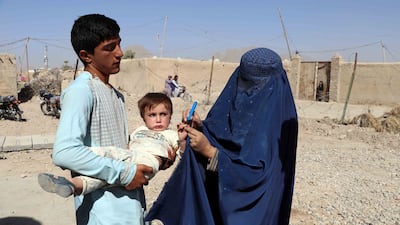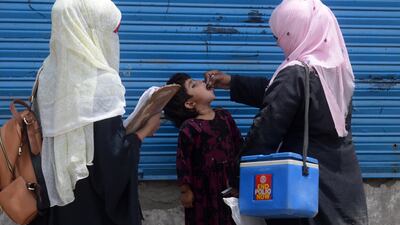Pakistan's first recorded polio case in more than a year served as a stark reminder that the global fight to eradicate the disease is still to be won.
Health officials announced this past Friday a 15-month-old boy had been left paralysed after contracting the wild polio virus in the north-western district of North Waziristan.
A recent case in Malawi was also traced back to Pakistan, with Africa considered free of wild polio virus.
It highlighted that as long as the wild virus circulates in Pakistan and Afghanistan, all nations remain at risk, in particular “vulnerable countries with weak public health and immunisation services and travel or trade links to endemic countries”, as the World Health Organisation puts it.
According to Prof Gareth Williams, a doctor and researcher who wrote Paralysed with Fear: The Story of Polio, the world is “agonisingly close” to eliminating the disease, with only a handful of “wild” polio cases being detected annually.
“If you go back 10 years, the cases each year were between 20 and 100. We are now down to just five cases a year,” he said.
Pandemic slows important progress
“A couple of years ago there were just two … then Covid came along, which drove a tractor through the national vaccination schedule, particularly in places like Afghanistan and Pakistan, where it matters.”
In these two nations, blighted by difficulties associated with their vaccination programmes, the wild polio virus, the naturally occurring pathogen, is “clinging by a thread” and — unlike in every other nation — remains endemic.
“We must … make sure it is eradicated before we can relax and say it is locked away in the museum of medical history,” said Prof Williams.
Israel takes action over own outbreak
A recent outbreak in Israel, its first in three decades, did not involve the wild polio virus but a circulating vaccine-derived polio virus (cVDPV), a form that originates from the oral polio vaccine (OPV), administered as drops into a child’s mouth.
These drops contain a weakened form of the polio virus and, in populations where vaccination rates are low, this may circulate between people and mutate into a form that causes paralysis.
Risks from vaccination are, however, low. In figures published in 2019, the Global Polio Eradication Initiative said that the more than 10 billion doses of OPV given to more than three billion children since 2000 resulted in slightly more than 1,000 cases of cVDPV paralysis.
Outbreaks of cVDPV can be eliminated through good surveillance systems and vaccination, with PGEI noting that these methods stopped a flare-up in Syria in “a matter of months” in 2017.
Another, in Somalia in 2018, which resulted in seven children becoming paralysed, was also stamped out.
Late last year, Ukraine reported cases of cVDPV, with the virus able to spread because the country’s vaccination rates were poor even before the Russian invasion.
Only 53 per cent of one-year-olds in Ukraine were jabbed as of October last year, with vaccine coverage especially modest because of disruption caused by Covid-19.
The pandemic has hampered vaccine campaigns for polio and other childhood disease in many nations.
In Israel, a national polio campaign for teenagers up to the age of 17 was recently launched to cover those unvaccinated.
Although the WHO said there is a “moderate” risk of wider infection, an unvaccinated child was found to have the virus in Jerusalem city in March.
A further eight children were found to be infected with the virus in the following weeks, with one suffering paralysis.
Routine monitoring of wastewater in the cities of Tiberias, Bnei Brak, Beit Shemesh and Modi'in Illit also revealed traces of poliovirus.
Dr Moshe Ashkenazi, deputy director of Sheba Medical Centre's Safra Children's Hospital in Tel Aviv, said parents had become complacent about the risk.
“Unfortunately some communities are not vaccinated, and polio can spread,” he said.
“If they are unvaccinated, immunity is weak and these people are vulnerable.
“There is a certain vaccine tiredness, as people are less keen to vaccinate themselves and their children.
“We have seen a dramatic decrease in the percentage of children vaccinated as normal, unfortunately, as a repercussion of the pandemic.”
Israel has a mandatory vaccination programme for children but parents can still legally refuse to vaccinate.
Some kindergartens refuse to accept children who have not taken the polio vaccine, as it is part of the national childhood immunisation plan.
“I am not worried, as a national campaign will help,” said Dr Ashkenazi.
“Most people will have light symptoms, like a runny nose or dizziness. But some are ignorant of the risk.
“We see people in Israel born in the 1950s in wheelchairs, who are monuments of past polio infections to make us aware of the impact it can have.”
Polio an age-old health concern
The risks associated with vaccination are dwarfed by the dangers of polio itself — or poliomyelitis to use the full name.
The disease’s effects were identified in cultures such as Ancient Egypt, although the first recorded clinical description was not made until the late 18th century.
Polio spreads from person to person and in most people, typically passing through the gut without causing symptoms.
However, in about 10 per cent of cases, it enters the bloodstream, while in fewer than one per cent of people, it enters the central nervous system, where it can cause damage that results in paralysis.
For every case of paralysis, there may be 200 to 300 undetected cases.
Stepping up efforts to eliminate polio
This week the Global Polio Eradication Initiative, which includes the World Health Organisation, Unicef, the US Centres for Disease Control and Prevention, the Bill and Melinda Gates Foundation, and Gavi, the Vaccine Alliance, began efforts to fund its strategy for 2022 to 2026.
Requiring $4.8 billion, this initiative aims to vaccinate 370 million children a year against polio for the next five years. The UAE in particular has been committed to ending polio across the world. In 2021 alone, the country donated $23m for polio campaigns in Pakistan, state news agency Wam reported. Since 2014, the UAE has contributed more than $200m to polio eradication efforts in Pakistan.
Describing wild polio cases as being at a “historic low”, the Global Polio Eradication Initiative, meanwhile, aims to integrate polio eradication into the wider health programmes of target nations.
Despite facing hostility to vaccines in Pakistan and Afghanistan, confidence in the programme remains high.
“The great thing about oral polio is you get a better immune response and it is so much easier to give,” Prof Williams said.
With the other main jab, the inactivated polio vaccine (IPV), the virus is inactivated by chemical treatment and cannot revert to virulence. This vaccine is, however, more burdensome to administer, being injected.
Work continues to develop and administer new vaccines. Ian Jones, a professor of virology at Reading University in the UK, is researching vaccine-like particles that are “inherently safe” because they do not consist of the virus itself.
“The technology to produce these vaccine-like particles is not quite there,” he said. “The issue is that the vaccine-like particles are just not quite as stable.”
As research continues, such hurdles may be overcome, offering another potential tool to prevent the spread of polio.
While the world has done much to control the polio virus — and may yet achieve its eradication, as happened with smallpox — there is no room for complacency.
“The vast majority of the world is vaccinated against polio, so the threat, even if live virus is around, is relatively low,” said Prof Jones.
“That situation would change if the current vaccine ceased to be used and people felt the threat wasn’t around … If vaccine rates were to drop, it would re-emerge as a threat.”
AT%20A%20GLANCE
%3Cp%3E%3Cstrong%3EWindfall%3C%2Fstrong%3E%0D%3Cbr%3EAn%20%E2%80%9Cenergy%20profits%20levy%E2%80%9D%20to%20raise%20around%20%C2%A35bn%20in%20a%20year.%20The%20temporary%20one-off%20tax%20will%20hit%20oil%20and%20gas%20firms%20by%2025%20per%20cent%20on%20extraordinary%20profits.%20An%2080%20per%20cent%20investment%20allowance%20should%20calm%20Conservative%20nerves%20that%20the%20move%20will%20dent%20North%20Sea%20firms%E2%80%99%20investment%20to%20save%20them%2091p%20for%20every%20%C2%A31%20they%20spend.%0D%3Cbr%3E%3Cstrong%3EA%20universal%20grant%3C%2Fstrong%3E%0D%3Cbr%3EEnergy%20bills%20discount%2C%20which%20was%20effectively%20a%20%C2%A3200%20loan%2C%20has%20doubled%20to%20a%20%C2%A3400%20discount%20on%20bills%20for%20all%20households%20from%20October%20that%20will%20not%20need%20to%20be%20paid%20back.%0D%3Cbr%3E%3Cstrong%3ETargeted%20measures%3C%2Fstrong%3E%0D%3Cbr%3EMore%20than%20eight%20million%20of%20the%20lowest%20income%20households%20will%20receive%20a%20%C2%A3650%20one-off%20payment.%20It%20will%20apply%20to%20households%20on%20Universal%20Credit%2C%20Tax%20Credits%2C%20Pension%20Credit%20and%20legacy%20benefits.%0D%3Cbr%3ESeparate%20one-off%20payments%20of%20%C2%A3300%20will%20go%20to%20pensioners%20and%20%C2%A3150%20for%20those%20receiving%20disability%20benefits.%3C%2Fp%3E%0A
ANATOMY%20OF%20A%20FALL
%3Cp%3E%3Cstrong%3EDirector%3A%20%3C%2Fstrong%3EJustine%20Triet%3C%2Fp%3E%0A%3Cp%3E%3Cstrong%3EStarring%3A%20%3C%2Fstrong%3ESandra%20Huller%2C%20Swann%20Arlaud%2C%20Milo%20Machado-Graner%3C%2Fp%3E%0A%3Cp%3E%3Cstrong%3ERating%3A%3C%2Fstrong%3E%205%2F5%3C%2Fp%3E%0A
Super Saturday results
4pm: Mahab Al Shimaal Group 3 | US$350,000 | (Dirt) | 1,200m
Winner: Drafted, Pat Dobbs (jockey), Doug Watson (trainer).
4.35pm: Al Bastakiya Listed | $300,000 | (D) | 1,900m
Winner: Divine Image, Brett Doyle, Charlie Appleby.
5.10pm: Nad Al Sheba Turf Group 3 | $350,000 | (Turf) | 1,200m
Winner: Blue Point, William Buick, Charlie Appleby.
5.45pm: Burj Nahaar Group 3 | $350,000 | (D) | 1,600m
Winner: Muntazah, Jim Crowley, Doug Watson.
6.20pm: Dubai City of Gold Group 2 | $300,000 | (T) | 2,410m
Winner: Old Persian, William Buick, Charlie Appleby.
6.55pm: Al Maktoum Challenge Round 3 Group 1 | $600,000 | (D) | 2,000m
Winner: Capezzano, Mickael Barzalona, Salem bin Ghadayer.
7.30pm: Jebel Hatta Group 1 | $400,000 | (T) | 1,800m
Winner: Dream Castle, Christophe Soumillon, Saeed bin Suroor.
UAE%20athletes%20heading%20to%20Paris%202024
%3Cp%3E%3Cstrong%3EEquestrian%3Cbr%3E%3C%2Fstrong%3EAbdullah%20Humaid%20Al%20Muhairi%2C%20Abdullah%20Al%20Marri%2C%20Omar%20Al%20Marzooqi%2C%20Salem%20Al%20Suwaidi%2C%20and%20Ali%20Al%20Karbi%20(four%20to%20be%20selected).%3C%2Fp%3E%0A%3Cp%3E%3Cstrong%3E%3Cbr%3EJudo%3Cbr%3E%3C%2Fstrong%3EMen%3A%20Narmandakh%20Bayanmunkh%20(66kg)%2C%20Nugzari%20Tatalashvili%20(81kg)%2C%20Aram%20Grigorian%20(90kg)%2C%20Dzhafar%20Kostoev%20(100kg)%2C%20Magomedomar%20Magomedomarov%20(%2B100kg)%3B%20women's%20Khorloodoi%20Bishrelt%20(52kg).%3C%2Fp%3E%0A%3Cp%3E%3Cstrong%3E%3Cbr%3ECycling%3Cbr%3E%3C%2Fstrong%3ESafia%20Al%20Sayegh%20(women's%20road%20race).%3Cstrong%3E%3Cbr%3E%3C%2Fstrong%3E%3C%2Fp%3E%0A%3Cp%3E%3Cstrong%3ESwimming%3Cbr%3E%3C%2Fstrong%3EMen%3A%20Yousef%20Rashid%20Al%20Matroushi%20(100m%20freestyle)%3B%20women%3A%20Maha%20Abdullah%20Al%20Shehi%20(200m%20freestyle).%3Cstrong%3E%3Cbr%3E%3C%2Fstrong%3E%3C%2Fp%3E%0A%3Cp%3E%3Cstrong%3EAthletics%3Cbr%3E%3C%2Fstrong%3EMaryam%20Mohammed%20Al%20Farsi%20(women's%20100%20metres).%3C%2Fp%3E%0A
THE BIO
Ambition: To create awareness among young about people with disabilities and make the world a more inclusive place
Job Title: Human resources administrator, Expo 2020 Dubai
First jobs: Co-ordinator with Magrudy Enterprises; HR coordinator at Jumeirah Group
Entrepreneur: Started his own graphic design business
Favourite singer: Avril Lavigne
Favourite travel destination: Germany and Saudi Arabia
Family: Six sisters
Biography
Favourite book: Zen and the Art of Motorcycle Maintenance
Holiday choice: Anything Disney-related
Proudest achievement: Receiving a presidential award for foreign services.
Family: Wife and three children.
Like motto: You always get what you ask for, the universe listens.
COMPANY PROFILE
Name: Kumulus Water
Started: 2021
Founders: Iheb Triki and Mohamed Ali Abid
Based: Tunisia
Sector: Water technology
Number of staff: 22
Investment raised: $4 million
What is Bitcoin?
Bitcoin is the most popular virtual currency in the world. It was created in 2009 as a new way of paying for things that would not be subject to central banks that are capable of devaluing currency. A Bitcoin itself is essentially a line of computer code. It's signed digitally when it goes from one owner to another. There are sustainability concerns around the cryptocurrency, which stem from the process of "mining" that is central to its existence.
The "miners" use computers to make complex calculations that verify transactions in Bitcoin. This uses a tremendous amount of energy via computers and server farms all over the world, which has given rise to concerns about the amount of fossil fuel-dependent electricity used to power the computers.
The%20specs
%3Cp%3E%3Cstrong%3EEngine%3A%20%3C%2Fstrong%3E3.0-litre%20twin-turbo%20V6%0D%3Cbr%3E%3Cstrong%3ETransmission%3A%20%3C%2Fstrong%3E10-speed%20auto%0D%3Cbr%3E%3Cstrong%3EPower%3A%20%3C%2Fstrong%3E400bhp%0D%3Cbr%3E%3Cstrong%3ETorque%3A%20%3C%2Fstrong%3E563Nm%0D%3Cbr%3E%3Cstrong%3EPrice%3A%20%3C%2Fstrong%3EDh320%2C000%0D%3Cbr%3E%3Cstrong%3EOn%20sale%3A%3C%2Fstrong%3E%20Now%3C%2Fp%3E%0A
More from Neighbourhood Watch:
The specs: 2018 Jaguar E-Pace First Edition
Price, base / as tested: Dh186,480 / Dh252,735
Engine: 2.0-litre four-cylinder
Power: 246hp @ 5,500rpm
Torque: 365Nm @ 1,200rpm
Transmission: Nine-speed automatic
Fuel consumption, combined: 7.7L / 100km
AWARDS
%3Cp%3E%3Cstrong%3EBest%20Male%20black%20belt%3A%20%3C%2Fstrong%3ELucas%20Protasio%20(BRA)%3Cbr%3E%3Cstrong%3EBest%20female%20black%20belt%3A%20%3C%2Fstrong%3EJulia%20Alves%20(BRA)%3Cbr%3E%3Cstrong%3EBest%20Masters%20black%20belt%3A%3C%2Fstrong%3E%20Igor%20Silva%20(BRA)%3Cbr%3E%3Cstrong%3EBest%20Asian%20Jiu-Jitsu%20Federation%3A%3C%2Fstrong%3E%20Kazakhstan%3Cbr%3E%3Cstrong%3EBest%20Academy%20in%20UAE%3A%20%3C%2Fstrong%3ECommando%20Group%2C%20Abu%20Dhabi%3Cbr%3E%3Cstrong%3EBest%20International%20Academy%3A%3C%2Fstrong%3E%20Commando%20Group%2C%20Abu%20Dhabi%3Cbr%3E%3Cstrong%3EAfrican%20Player%20of%20the%20Year%3A%20%3C%2Fstrong%3EKatiuscia%20Yasmira%20Dias%20(GNB)%3Cbr%3E%3Cstrong%3EOceanian%20Player%20of%20the%20Year%3A%20%3C%2Fstrong%3EAnton%20Minenko%20(AUS)%3Cbr%3E%3Cstrong%3EEuropean%20Player%20of%20the%20Year%3A%3C%2Fstrong%3E%20Rose%20El%20Sharouni%20(NED)%3Cbr%3E%3Cstrong%3ENorth%20and%20Central%20American%20Player%20of%20the%20Year%3A%20%3C%2Fstrong%3EAlexa%20Yanes%20(USA)%3Cbr%3E%3Cstrong%3EAsian%20Player%20of%20the%20Year%3A%20%3C%2Fstrong%3EZayed%20Al%20Katheeri%20(UAE)%3Cbr%3E%3Cstrong%3ERookie%20of%20the%20Year%3A%3C%2Fstrong%3E%20Rui%20Neto%20(BRA)Rui%20Neto%20(BRA)%3C%2Fp%3E%0A
The%20specs%20
%3Cp%3E%3Cstrong%3EEngine%3A%20%3C%2Fstrong%3EDual%20permanently%20excited%20synchronous%20motors%3Cbr%3E%3Cstrong%3EPower%3A%20%3C%2Fstrong%3E516hp%20or%20400Kw%3Cbr%3E%3Cstrong%3ETorque%3A%20%3C%2Fstrong%3E858Nm%3Cbr%3E%3Cstrong%3ETransmission%3A%20%3C%2Fstrong%3ESingle%20speed%20auto%3Cbr%3E%3Cstrong%3ERange%3A%20%3C%2Fstrong%3E485km%3Cbr%3E%3Cstrong%3EPrice%3A%20%3C%2Fstrong%3EFrom%20Dh699%2C000%3C%2Fp%3E%0A
Wicked: For Good
Director: Jon M Chu
Starring: Ariana Grande, Cynthia Erivo, Jonathan Bailey, Jeff Goldblum, Michelle Yeoh, Ethan Slater
Rating: 4/5
Chef Nobu's advice for eating sushi
“One mistake people always make is adding extra wasabi. There is no need for this, because it should already be there between the rice and the fish.
“When eating nigiri, you must dip the fish – not the rice – in soy sauce, otherwise the rice will collapse. Also, don’t use too much soy sauce or it will make you thirsty. For sushi rolls, dip a little of the rice-covered roll lightly in soy sauce and eat in one bite.
“Chopsticks are acceptable, but really, I recommend using your fingers for sushi. Do use chopsticks for sashimi, though.
“The ginger should be eaten separately as a palette cleanser and used to clear the mouth when switching between different pieces of fish.”
Full Party in the Park line-up
2pm – Andreah
3pm – Supernovas
4.30pm – The Boxtones
5.30pm – Lighthouse Family
7pm – Step On DJs
8pm – Richard Ashcroft
9.30pm – Chris Wright
10pm – Fatboy Slim
11pm – Hollaphonic

















